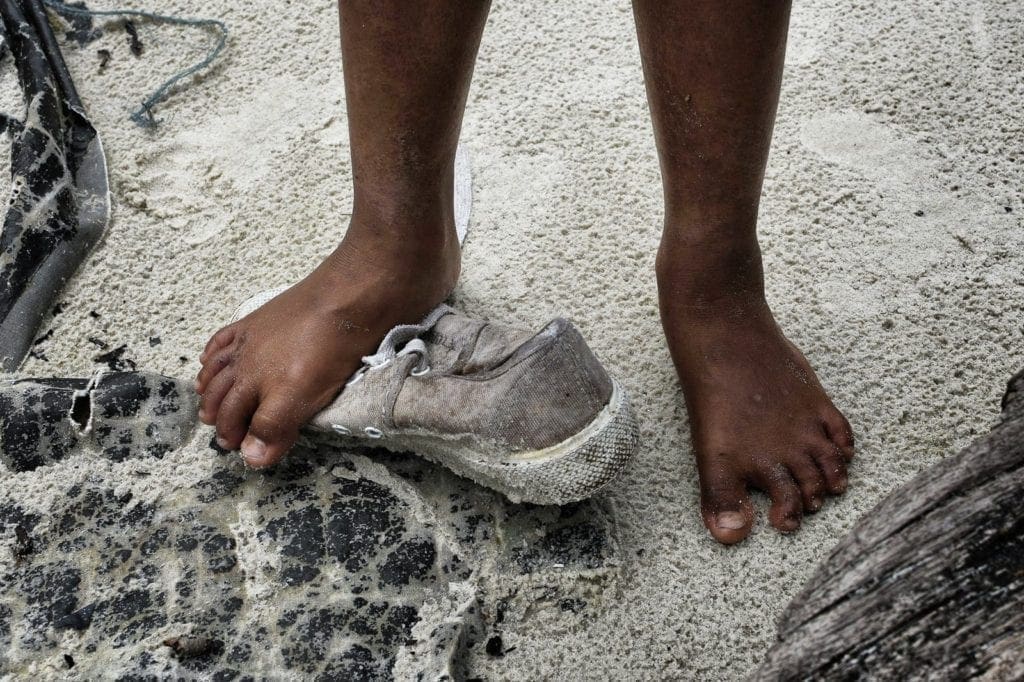Among the islands of the Mergui archipelago, off the southern coast of Burma and Thailand, lives a tribe of about 4000 people, called Moken, or more simply ‘sea gypsies‘. This is because they spend a large part of the year migrating as nomads from one island to another, aboard typical wooden boats, built by them, called ‘kabang‘. They settle on the mainland during the monsoon period, living on temporary stilts made of wood and metal sheets on the eastern side of the islands, thus sheltering from the storms.
Without names, without documents, without nationality, timeless. This is measured only by the winds, the waves of the sea and the moon. They do not have a calendar and most of them do not even know their age. They’re free. Free to navigate and adapt to the waves in an almost supernatural way. It is said that Moken children learn to swim before they can walk.
For a long time, their existence went unnoticed. The tribe made headlines in 2004 when a tsunami hit the Indian Ocean coast, killing more than 230,000 Thais. The Moken, thanks to their profound knowledge of the sea, were able to foresee the arrival of the ‘great wave’ by evacuating their villages and finding refuge on the heights. The fury of the tsunami claimed no lives among the “sea gypsies.”
According to their beliefs, “the big wave” or “the boon,” as it is called in their language, is invoked by ancestral spirits when they are angry. The moment this happens, the sea slowly recedes, then violently bursts in and swallows the people.

Small, brownish in colour, shy, reserved, and extremely vulnerable, so much so that they hardly have any contact with the outside world. They have always lived in an almost primitive way, procuring fish to barter for rice, a few clothes and useful tools for their boats. All united by a deep-rooted feeling of solidarity and community.
This free and anarchic lifestyle of theirs, which recognises no national boundaries, is, however, under serious threat. The Burmese and Thai authorities consider it an obstacle to tourism, so much so that they try to hinder it in every way. In recent years, there have been several political interventions, which have put the Moken in serious difficulties. First, their territories were reduced and limits were placed on free navigation, to promote tourism and industrial fishing. Secondly, they tried to settle them within parks and villages, built especially for them as a tourist attraction, forcing them to lose their cultural identity. Some have succumbed to the will of South East Asian governments and, for a living, make and sell souvenirs for tourists, or ferry them from one island to another.
But this is a way of life that is too remote for them: reproducing their natural environment on land in full respect of traditions is impossible. Many become ill, some fall into depression, and others indulge in alcohol and drugs. But some resist and oppose this contamination, trying to preserve the tribal lifestyle that has always characterised them. They are those who continue to navigate the waters of the Andaman Sea aboard ‘kabangs’. Boats that, depending on the situation, are home, refuge, or working tools. These are mostly men, almost absent in the villages. Women, on the other hand, work for them on land, weaving or repairing the nets needed for fishing. Raising and caring for children, taking care of household matters. The Moken live in symbiosis with the sea, they have no ties to any particular land.
Roads or bridges of hard concrete may break, but never will the cord that binds them to the waters. You only have to get on a raft and cling to this ‘cordon’ to be pulled into this world, which has remained afloat between land and sea.

